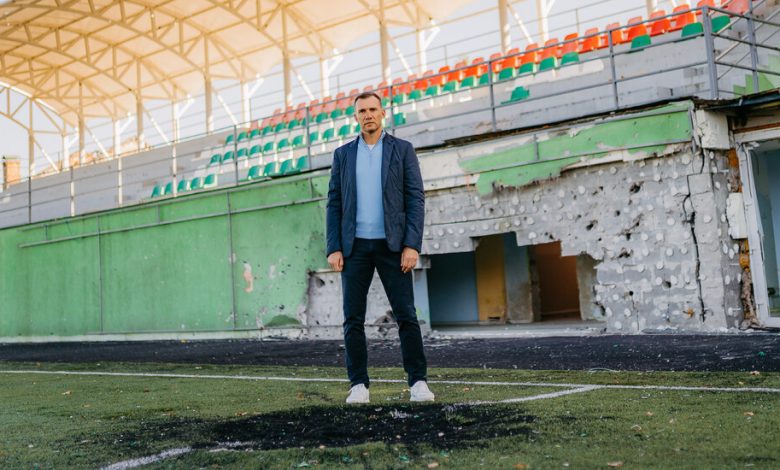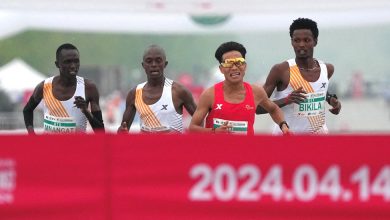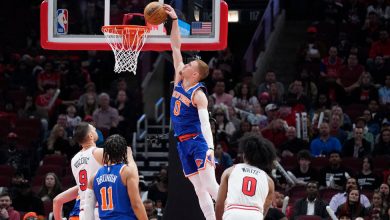Ukraine Waits for a Tomorrow It Cannot See

There are certain things Andriy Shevchenko cannot talk about. The feeling generated by the wailing of an air-raid siren. The dread instilled by learning just how many missiles had been aimed the previous night at you, your loved ones, your home. The sensation of knowing another swarm of drones is on its way, the only hope that each one can be shot from the sky.
Shevchenko does not want to repeat all he has heard from the Ukrainian soldiers posted to the battlefield, that rift that runs through places that were once nearby and familiar but are now alien, part of a terrifying front line. He starts and stops, swallowing hard, unable to go on. “I don’t want to speak about what is going on,” he said.
One of the stories he cannot quite bring himself to tell comes from Irpin, a city on the northwestern edge of the Ukrainian capital, Kyiv, that was the scene of some of the bloodiest, most intense fighting in the early days of the war. Its streets were pounded by airstrikes. A mass grave was found in neighboring Bucha.
When Ukrainian forces, after a monthlong counteroffensive, reclaimed control of the city, they found it scarred beyond recognition. Some estimates had it that 70 percent of its structures had been destroyed or damaged. Among them was the city’s soccer stadium.
A few months later, Shevchenko went to visit. As he walked around the fractured shell of the place — the artificial-turf field pockmarked with the scars of war, the ramshackle stands charred black — he saw a group of children playing soccer, doing their best to stage a game despite the ruin all around them, and at least mildly oblivious to the fact that Shevchenko, the greatest player their country has ever produced, was watching.
One of the strengths Ukrainians in general have discovered during the war, Shevchenko has found, is an ability “to adapt to circumstances, to react to the situation as it is now.” Here it was, being played out in front of him.
When he asked the children what it was like having to play here, in a place where a stadium used to be, they replied in that matter-of-fact manner that is the natural tone of the preteen: They might not have a stadium, they said, but that did not mean they did not want to play soccer.
As the fighting was escalating in Irpin, Heorhiy Sudakov — a sparkling young midfielder with Shakhtar Donetsk — was, like so many in Ukraine, seeking shelter wherever he could find it. He sent one of his former coaches a photo from an air-raid bunker. In the image, his pregnant wife, Lisa, rested her head on his shoulder.
A little more than a year later, Sudakov has spent two weeks announcing himself as one of the brightest talents in European soccer. He helped drive Ukraine’s teams to the semifinals of the European Under-21 Championship in Georgia, scoring three times in five games, including two in the quarterfinal victory against France.
That Ukraine was unceremoniously eliminated in the final four by Spain — which will face England in the final this weekend — would, in normal circumstances, act as a sort of bathetic coda to its tournament. Ukraine’s circumstances, though, are anything but normal. In that light, its performance has been a resounding, uplifting triumph.
“What the under-21s have done is an incredible achievement,” Shevchenko said in an interview this week. “Ukraine has always provided great talent — maybe not every year, but every few years, we have a young player who can go up to the senior squad. You need to build that platform. Watching what they have done in this tournament gives hope to us, and to the next generation, for the future.”
Nobody in Ukraine knows, of course, what that future looks like. Since the country’s soccer league resumed last August, Ukraine’s clubs have grown used to playing against the eerie backdrop of empty stadiums. Games have been interrupted by those same air-raid sirens that still send a shiver down Shevchenko’s spine. Dozens of foreign players left the country after being given dispensation by FIFA to break their contracts.
Several teams, including Shakhtar, temporarily relocated their academy systems abroad — spiriting players and members of their families out of the country — to protect them from the Russian invasion. Some clubs, Shakhtar most prominent among them, still find themselves exiled from their homes, their traditional territories now on the other side of the front line.
It is impossible to say when, or if, any of that will change. Like everything else in the country, every person in every aspect of life, Ukrainian soccer has no idea what tomorrow will bring.
“We live in the moment,” Shevchenko said. “Everything depends on the war. The situation could change every day. We try to make plans, sometimes short-term, sometimes a little longer. But we have to react every day.
“We do the best we can to let the athletes train, to help them be ready to play — that is what all of us, every club, are trying to do. We have the resources to do that at the moment. But we cannot plan anything for the future, because the moment we do, everything could change. That is what we have to do. There is not a different way. We just have to keep living and try to do the best we can.”
In light of all that is happening in Ukraine, soccer is not a priority, nor should it be. It is difficult, in many ways, to think that it matters at all. But talking to Shevchenko is to be reminded of Jürgen Klopp’s old aphorism: Perhaps it is the most important of the least important things.
Sports, after all, remain a potent way of reminding people of what Ukraine has been through — is going through. They are a way of keeping the country uppermost in the fickle thoughts of the outside world, a gleaming example of what the historian Eric Hobsbawm described as the “imagined community of millions seeming more real as a team of eleven named people.”
Soccer has, by and large, embraced that role. “It has a power to unite people,” Shevchenko said. “To send a message of solidarity.” Stadiums across Europe have been festooned with Ukrainian flags. Messages demanding peace have appeared on television screens and advertising boards — a gesture that is, without question, too small, a coward’s way out from Europe’s ever-compromised soccer authorities, but is a gesture nonetheless.
When Shevchenko, with his successor as Ukraine’s national team captain, Oleksandr Zinchenko — both ambassadors for United24, the country’s official fund-raising platform — decided to arrange an exhibition game to help rebuild a school in the village of Chernihiv, support was immediate and enthusiastic. Chelsea, one of Shevchenko’s former clubs, volunteered the use of Stamford Bridge for the match, called the Game4Ukraine, on Aug. 5. DAZN and Sky agreed to broadcast it. A parade of stars quickly agreed to play.
“It is a good chance for us to remind people that the war is still going on,” Shevchenko said. “Oleksandr and I have done a lot of interviews, to try to keep it in the news, so that the rest of the world does not forget, so that people keep helping, because we need them to know that we cannot do this without them.”
But soccer matters for another reason. It is telling that the success of Ukraine’s under-21 team — as well as an encouraging start as national team manager for Serhiy Rebrov, Shevchenko’s old strike partner — has not gone unnoticed within Ukraine, that the achievements of Sudakov and his teammates have been celebrated, even as the sirens have sounded.
“There is still room for life, still room for sport,” Shevchenko said. “That is why we are fighting: for the right to have a normal life. Even during the war, we try to live as best we can. It has to be day to day.”
The conversation he had with the children in Irpin inspired Shevchenko. When he left, he set about raising the money — roughly 600,000 euros, or $650,000 — it would take to ensure that they could both play soccer and have a stadium. He arranged a gala in Milan, the city he long called home. The club where he became a superstar, and possibly the best striker of his generation, A.C. Milan, kicked in €150,000 toward the project.
The plan is to begin work on the stadium this summer. It is impossible, of course, to plan for anything with absolute certainty. Ukrainians have, in the course of 18 fearful, defiant, harrowing months, grown used to the idea that things might change at a moment’s notice. They do not know what tomorrow will bring. But they know there will be a tomorrow.
Correspondence
This week brought a regrettable, but undeniable, turn in the timbre of correspondence. This is, as we all know, a conspiratorial age — the false flags, the deep state, the thing about orcas ganging up and attacking boats — and that paranoia now seems to have filtered through to the last bastion of enlightenment thinking: my inbox.
“Writing that Botafogo, RWD Molenbeek and Lyon are linked together without mentioning Crystal Palace,” an exasperated Nicholas Armstrong wrote after receiving last week’s newsletter, “is like saying whales, dolphins and porpoises are linked without mentioning any other more familiar mammal.”
I am not entirely certain which mammal is missing from that list — sharks, maybe? — but I stand by my entirely deliberate omission: not because I have not yet forgiven Palace for the whole Alan Pardew thing in 1990, but because, unlike that particular set of clubs, Palace is not owned exclusively by John Textor. It is, instead, a partial member of two networks: one belonging to Textor, and one operated by Bolt Football. And that would have been confusing.
Paul Gerald, meanwhile, has been pondering an unexplainable, at least to him, coincidence. “Whenever there is a neutral venue final, each team always attacks the end containing their fans in the second half,” he wrote.
He added, “There are three ways this could happen: crazy coincidence; teams just always picking that way, regardless of who wins the coin toss; or prearrangement.” In this scenario, he suggested, “no real coin toss ever happens.”
There is, I suspect, a slightly simpler explanation: Both teams go into the coin toss intending to kick toward their own fans in the second half. There is a possibility, though, that there is a degree of confirmation bias at play here, too. My guess would be it happens less often than you believe — you just notice when it does.
Victor Gallo, thankfully, wants to return to the world of facts. Last week’s newsletter taught him that the Colombian league is divided into Apertura and Clausura stages. “I thought only Mexico employed that division,” he wrote. “I imagine it is not just Mexico and Colombia. But what’s the reason behind splitting the season up?”
That is a great question, and not one I have previously considered. It means you can hand out more trophies? It delivers satisfaction more quickly? It means you can stage a grand final at the end? If anyone can shed any light, it would be enormously helpful.
And finally, with a nod to William Ireland, a confession. Last week’s newsletter asserted that nobody — other than Red Bull — had really made the multiclub model work in soccer as yet. “Best practices being shared, discount transfer fees, places to park players all sound good,” he wrote. “None seem to be actually happening in any of the multiclubs, and I’m not sure how they would.”
Nor am I, but there was one element that I neglected to mention (and was pointed out to me, anonymously, by an executive at one of the teams involved in a network). Off the field, the advantages are legion. Adding more clubs enables a group to increase the asset value of each — by building infrastructure, improving performance, pooling resources — which helps the value of the whole business grow. It may well be that is the real purpose of the whole exercise.




